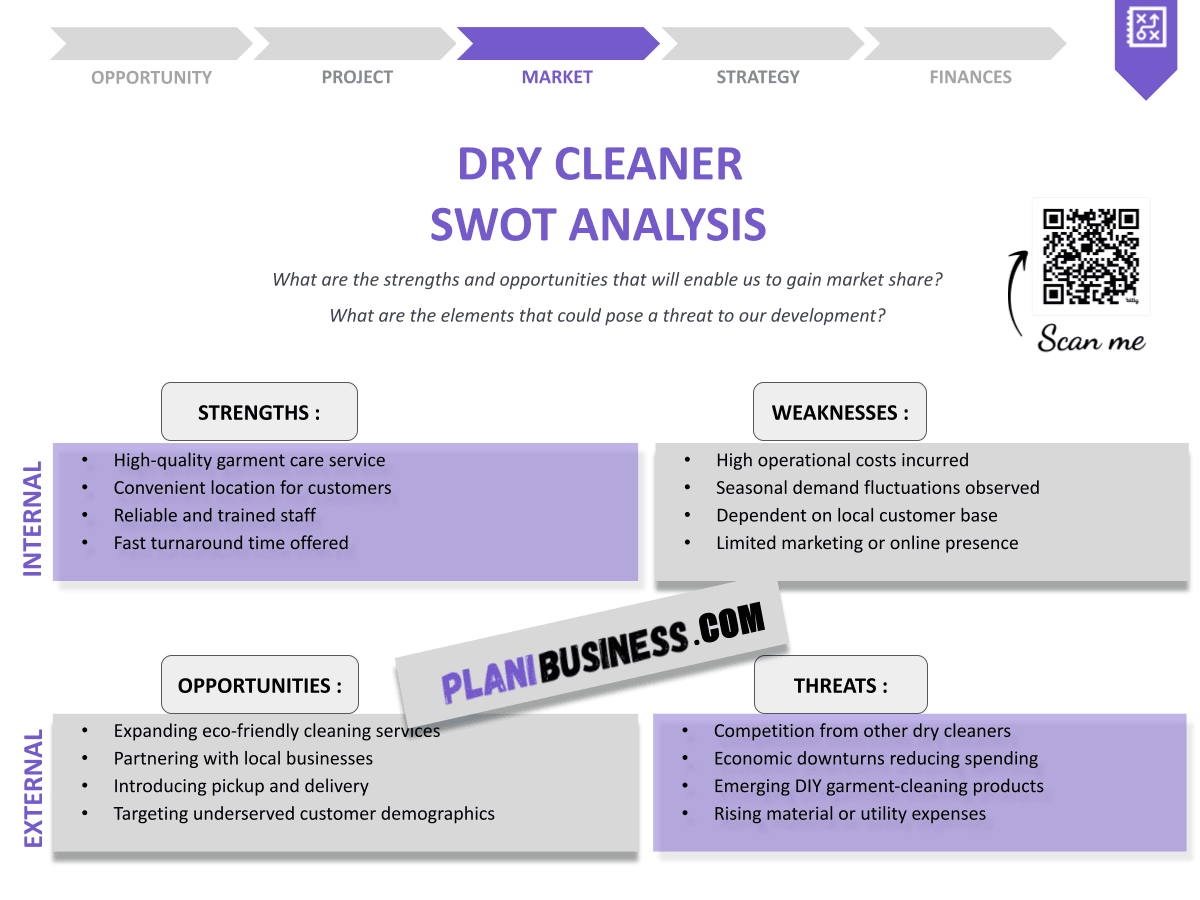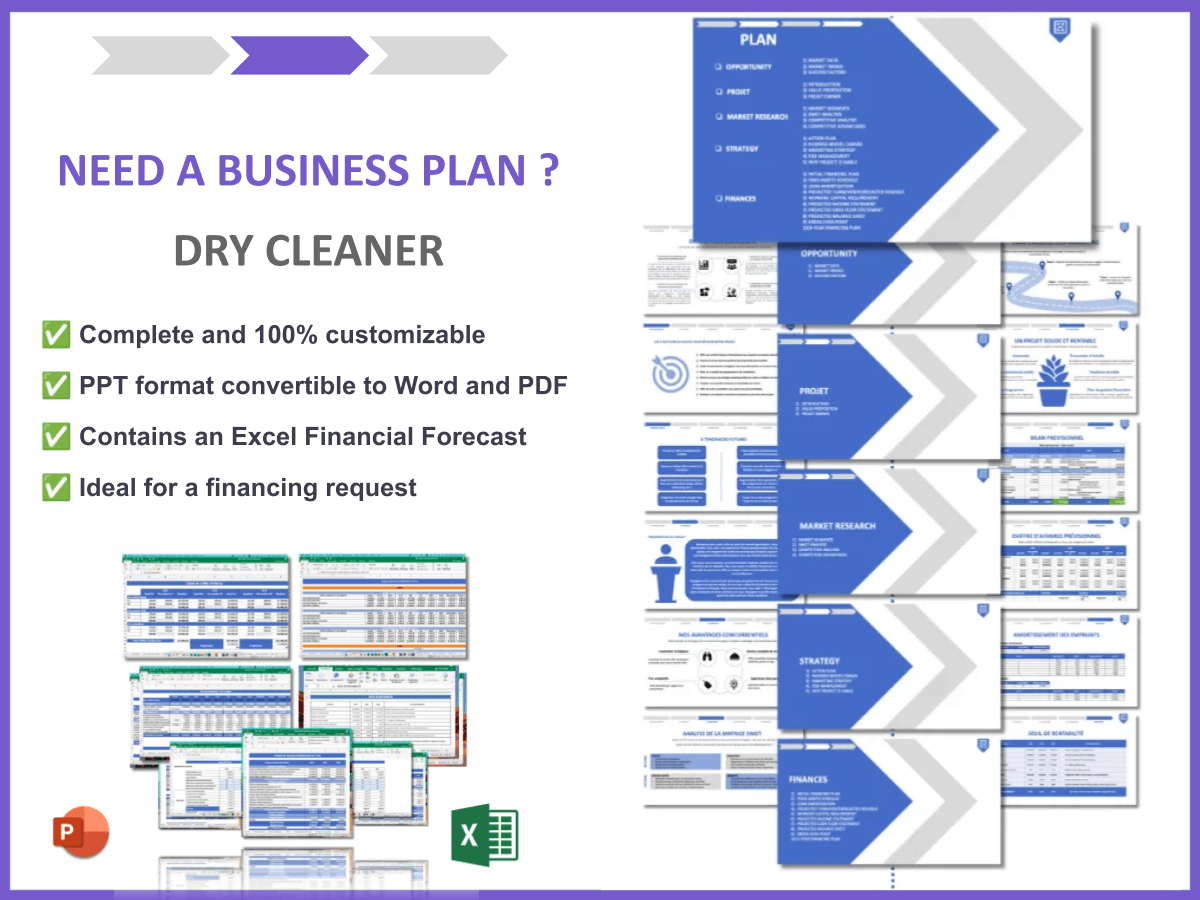Why Should You Have a SWOT Analysis for Your Dry Cleaning Business?
Have you ever thought about why some dry cleaners thrive while others struggle? It’s a tough world out there in the laundry game! Conducting a Dry Cleaner SWOT Analysis can be your secret weapon. A SWOT analysis is a strategic planning tool that helps you identify the Strengths, Weaknesses, Opportunities, and Threats facing your business. It’s like having a map that shows you where to go and where to avoid pitfalls.
Here are a few reasons why having a SWOT analysis is essential for your dry cleaning business:
- Understand your business’s internal strengths and weaknesses.
- Identify external opportunities for growth.
- Recognize potential threats to your business.
- Improve decision-making for future strategies.
- Tailor marketing strategies to target customer needs.
- Enhance operational efficiency.
- Increase competitiveness in the market.
- Foster better team collaboration.
- Support long-term business planning.
- Create a foundation for continuous improvement.
How Do You Write a SWOT Analysis for Your Dry Cleaning Business?
Writing a SWOT analysis might seem daunting, but it’s pretty straightforward. Here’s a breakdown:
Strengths
Strengths are what you do well. This could be your loyal customer base, quality of service, or prime location.
Weaknesses
Weaknesses highlight areas for improvement. This might include limited marketing efforts or outdated equipment.
Opportunities
Opportunities are external chances to grow, like trends in eco-friendly cleaning or new delivery services.
Threats
Threats are external challenges that could harm your business, like rising competition or economic downturns.
SWOT Example N°1 for a Boutique Dry Cleaner
Boutique dry cleaners often focus on high-end clients. Here’s a SWOT analysis for this type of business.
| SWOT | Analysis |
|---|---|
| Strengths | High-quality service, personalized customer care |
| Weaknesses | Higher price point may deter budget-conscious customers |
| Opportunities | Growing trend for eco-friendly cleaning solutions |
| Threats | Increasing competition from cheaper options |
- Personalized service attracts high-end clientele.
- Niche marketing strategies can be effective.
- The demand for eco-friendly options is rising.
- Competition is fierce in urban areas.
- Boutique dry cleaners can capitalize on unique services, but they need to be aware of their pricing strategy. Eco-friendly offerings could set them apart, but competition is always lurking around the corner.
SWOT Example N°2 for a Budget-Friendly Dry Cleaner
Budget-friendly dry cleaners cater to cost-conscious customers. Here’s how their SWOT analysis looks.
| SWOT | Analysis |
|---|---|
| Strengths | Affordable prices, quick turnaround times |
| Weaknesses | Lower profit margins, less personalized service |
| Opportunities | Expansion into online booking and delivery |
| Threats | Economic downturns affecting discretionary spending |
- Quick service appeals to busy customers.
- Online services can attract new clients.
- Keeping prices low can limit profits.
- Market fluctuations may impact business stability.
- Budget-friendly options can thrive on volume, but they must balance cost and service quality. Online services could be a game-changer, especially in a tech-savvy market.
SWOT Example N°3 for a Mobile Dry Cleaning Service
Mobile dry cleaning services bring convenience to customers. Here’s their SWOT analysis.
| SWOT | Analysis |
|---|---|
| Strengths | Convenience, time-saving for customers |
| Weaknesses | Limited service areas, higher operational costs |
| Opportunities | Partnerships with local businesses |
| Threats | Regulatory challenges in transportation |
- Convenience is a major selling point.
- Operational costs can be high due to logistics.
- Collaborations can enhance service offerings.
- Regulations may impose limitations.
- Mobile services offer unmatched convenience, but they come with unique challenges. Partnering with local businesses can expand reach, but it's crucial to stay compliant with local laws.
SWOT Example N°4 for an Eco-Friendly Dry Cleaner
Eco-friendly dry cleaners target environmentally conscious consumers. Here’s their SWOT analysis.
| SWOT | Analysis |
|---|---|
| Strengths | Sustainable practices, growing market demand |
| Weaknesses | Higher operational costs, niche market |
| Opportunities | Educational marketing on sustainability |
| Threats | Competition from traditional cleaners |
- Sustainable practices can attract a loyal customer base.
- Higher costs may deter some clients.
- Education can enhance customer loyalty.
- Traditional cleaners may adapt to eco-friendly practices.
- Eco-friendly cleaners can create a strong brand identity, but they need to communicate their value effectively. Education around sustainability can help win over skeptical customers.
SWOT Example N°5 for a Franchise Dry Cleaner
Franchise dry cleaners benefit from brand recognition. Here’s their SWOT analysis.
| SWOT | Analysis |
|---|---|
| Strengths | Established brand, proven business model |
| Weaknesses | Franchise fees, less flexibility in operations |
| Opportunities | Expansion into new markets |
| Threats | Franchise regulations and compliance issues |
- Brand recognition can drive traffic.
- Franchise fees can cut into profits.
- New markets offer growth potential.
- Compliance can be a headache.
- Franchises have the advantage of a built-in customer base, but they must navigate fees and regulations. Exploring new markets can lead to exciting opportunities.
SWOT Example N°6 for a Specialty Stain Removal Service
Specialty stain removal services cater to specific needs. Here’s their SWOT analysis.
| SWOT | Analysis |
|---|---|
| Strengths | Expertise in stain removal, high customer satisfaction |
| Weaknesses | Limited customer base, niche market |
| Opportunities | Growing demand for specialty cleaning |
| Threats | Competitors offering broader services |
- Expertise can drive customer loyalty.
- Niche markets can limit growth potential.
- Specialty services are in demand.
- Broader service offerings may dilute focus.
- Specialty services can build a loyal customer base, but they need to market effectively. As demand grows, competition may intensify.
SWOT Example N°7 for a 24-Hour Dry Cleaner
24-hour dry cleaners cater to night owls and busy professionals. Here’s their SWOT analysis.
| SWOT | Analysis |
|---|---|
| Strengths | Convenience, flexibility for customers |
| Weaknesses | Higher operational costs, potential for lower quality |
| Opportunities | Targeting late-night workers |
| Threats | Staffing challenges, economic downturns |
- Convenience is a major advantage.
- Operational costs can be high.
- Targeting specific demographics can boost business.
- Economic changes may impact customer behavior.
- 24-hour services provide unmatched convenience but come with unique challenges. Targeting night workers could create a niche market.
SWOT Example N°8 for a Family-Owned Dry Cleaner
Family-owned dry cleaners often have a community feel. Here’s their SWOT analysis.
| SWOT | Analysis |
|---|---|
| Strengths | Strong community ties, personalized service |
| Weaknesses | Limited resources for marketing and expansion |
| Opportunities | Leveraging local connections for growth |
| Threats | Competition from larger chains |
- Community ties can foster loyalty.
- Limited marketing resources may hinder growth.
- Local connections can open doors.
- Larger chains can overshadow smaller businesses.
- Family-owned businesses can thrive on community support, but they must find creative marketing solutions to compete with larger chains.
SWOT Example N°9 for a High-Volume Industrial Dry Cleaner
High-volume industrial dry cleaners serve large clients. Here’s their SWOT analysis.
| SWOT | Analysis |
|---|---|
| Strengths | High capacity, established client relationships |
| Weaknesses | High operational costs, dependency on few clients |
| Opportunities | Expanding into new industries |
| Threats | Economic fluctuations affecting client budgets |
- High capacity can drive profitability.
- Dependency on a few clients can be risky.
- New industries can offer growth opportunities.
- Economic downturns may impact demand.
- Industrial cleaners can benefit from high volume but must diversify their client base to mitigate risks.
SWOT Example N°10 for a Seasonal Dry Cleaner
Seasonal dry cleaners cater to specific times of the year. Here’s their SWOT analysis.
| SWOT | Analysis |
|---|---|
| Strengths | Specialized services during peak seasons |
| Weaknesses | Limited operation times, reliance on seasonality |
| Opportunities | Expanding services to off-peak times |
| Threats | Weather fluctuations affecting demand |
- Specialization can attract seasonal customers.
- Limited operation can hinder revenue.
- Expanding services can stabilize income.
- Weather can be unpredictable.
- Seasonal services can create niche markets but need to find ways to generate income year-round.
Conclusion
In conclusion, conducting a Dry Cleaner SWOT Analysis is crucial for understanding your business landscape. By identifying your strengths, weaknesses, opportunities, and threats, you can make informed decisions that propel your business forward. So, roll up your sleeves and start analyzing—your business will thank you!
If you’re looking for a solid foundation to build your business, consider checking out this good business plan template for dry cleaners. It will help guide you in the right direction. Also, don’t miss our articles on How To Start a Dry Cleaner? and How To Write a Dry Cleaner Marketing Plan? for more insights!
FAQ
1. What is a SWOT analysis?
A SWOT analysis is a strategic tool used to assess the strengths, weaknesses, opportunities, and threats associated with a business.
2. Why is a SWOT analysis important for dry cleaners?
This analysis helps dry cleaning businesses understand their market position and make strategic decisions.
3. How do I identify my strengths?
Consider what sets your dry cleaning business apart, such as unique services, loyal customers, or prime locations.
4. What common weaknesses do dry cleaners face?
Common weaknesses include limited marketing efforts, outdated equipment, and sometimes insufficient staff training.
5. What opportunities can dry cleaners explore?
Opportunities might include embracing eco-friendly cleaning trends, expanding delivery services, or utilizing technology for online bookings.
6. How can threats impact my dry cleaning business?
Threats such as increased competition, economic downturns, and changing consumer preferences can negatively affect your customer base and revenue.
7. Can I conduct a SWOT analysis by myself?
Absolutely! You can perform a SWOT analysis independently or with your team to gain different perspectives.
8. How often should I update my SWOT analysis?
It’s recommended to review your SWOT analysis at least once a year or whenever significant changes occur in your business or the market.
9. What should I do after completing a SWOT analysis?
Use the insights gained to create a strategic plan that leverages your strengths and opportunities while addressing weaknesses and threats.
10. Where can I find examples of SWOT analyses for dry cleaners?
You can find examples in industry reports, business blogs, or by researching successful dry cleaning businesses.







